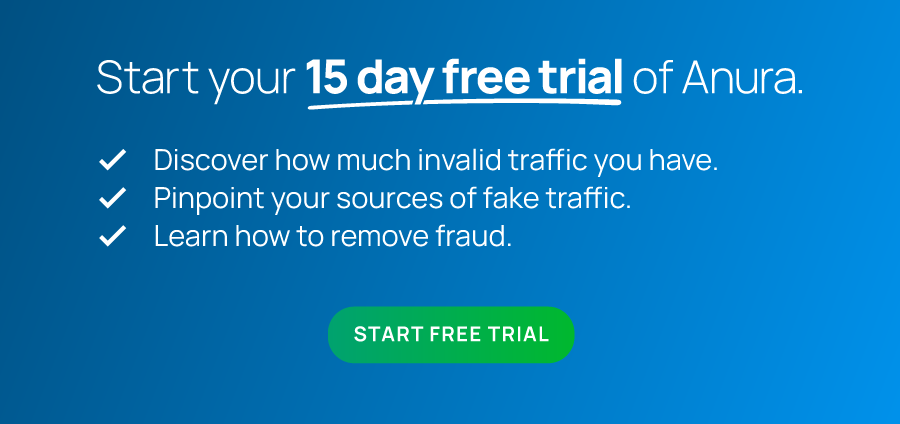TL;DR: Understanding and Combating Bot Farms.
- Definition: A bot farm is a network of bots spread across multiple locations, used to mimic human online interactions.
- Types: Includes click bots, bot form-fills, social media bots, and scraper bots.
- Usage: Primarily for generating fake traffic for profit, sabotaging competitors, or collecting intelligence.
- Protection: Businesses can use advanced bot detection solutions like Anura to safeguard their digital assets and prevent ad fraud.
Not all traffic is created equal.
While businesses always strive for qualified leads, there are hidden disruptors around every corner.
Bot farms, in particular, pose a major threat to internet traffic. These sophisticated networks of automated programs are designed to mimic human behavior online, from clicking on ads to swiping through social media. The primary goal of a bot farm is to inflate traffic or conversions in a way that appears legitimate but delivers no real value to your business. As these bot accounts become more advanced, businesses need a modern solution to stay a step ahead.
Consider this the who, what, and why behind bot farms so you can start protecting your marketing efforts.
Understanding the meaning of a bot farm is important to protect marketing investments from automated fraud.
What Are Bot Farms?
When you think of a bot farm, images of vast digital plantations where lines of code are cultivated might come to mind. Or maybe a warehouse packed with hundreds of smartphones or tablets.
The reality is both more complex and more abstract.
So, what are bot farms?
Bot farms are essentially a bunch of different bots running in conjunction. You might think that they're required to be in the same physical location, but that's not always the case. With the Internet, they can be set up anywhere you want.
All of this is to say that bot farms are not limited by geography. They can be distributed across multiple different Internet Service Providers (ISPs) and regions. This decentralization is key to their operation and effectiveness.
By spreading out the infrastructure, bot farmers can maximize their reach and impact while minimizing detection. A bot farmer is the individual or organization that builds, maintains, or operates a bot farm. Bot farmers control how bots behave, when they are activated, and which campaigns or platforms they target. In digital advertising, bot farmers often use these networks to drain ad budgets, manipulate attribution, and skew performance data without being immediately detected.
Types of Malicious Bots
Like on real farms, you can find lots of different bots being “grown” around the Internet. Some of the most common types of bad bots include:
- Click Bots: Click bots are perhaps the most well-known type of bot associated with bot farms. These bots are programmed to automatically click on digital advertisements, links, or web pages. The goal is to inflate engagement metrics artificially.
- Bot Form-Fills: Sophisticated bots mimic the behavior of a human user. They will typically use a real IP address and browser, and they will enter valid contact information.
- Social Media Bots:Social media bots are automated programs that mimic human interactions on social media platforms. They can like, share, comment, and even create posts.
- Scraper Bots: Scraper bots are designed to harvest content and data from websites without permission. The data is often used by competitors to gain a competitive edge or sold illicitly on the dark web.
Why Are Bot Farms Used?
So, why would people use bot farms? There are a few different reasons, but they all center around personal gain and/or disruption.
Primarily, bot farms are used to generate fake traffic, such as clicks, for financial gain. Creating false interactions with online advertisements inflates engagement metrics and drains advertising budgets. Advertisers pay for these engagements, thinking they are from genuine potential customers, while the operators of bot farms collect revenue from these fraudulent activities.
Bot farms are a lucrative business, but it’s not always about financial gain. These farms can also be used to sabotage a competitor’s online operations or gain intelligence.
Who Uses Bot Farms?
Since bot farms are used for a variety of activities, they are also used by a diverse array of bot farmers. Here are just a few examples of who would use bot farms and their motive:
- Cybercriminals: At the forefront are cybercriminals who utilize bot farms to carry out fraudulent activities for financial gain. By automating repetitive tasks, cybercriminals can operate on a massive scale.
- Unethical Businesses: Some businesses employ bot farms as a competitive strategy, using them to sabotage competitors or artificially inflate their own online presence.
- Affiliates: Some affiliates pay bot farms to generate fake leads or transactions or engage in click fraud to inflate their commissions.
- Researchers and Developers: Bots aren’t all bad. Sometimes researchers and developers can use ethical bots for testing purposes.
How to Protect Your Business from Bot Farms
Safeguarding your online presence from malicious bots is crucial for maintaining the integrity and performance of your digital assets. Since bot farms are becoming increasingly more sophisticated, businesses need a robust solution to keep up.
To defend against advanced bot farms and bot farmers, businesses should monitor for traffic that mimics bot activity. Real-time bot mitigation tools must be complemented by continuous traffic validation and detection to identify AI-powered bots before they distort analytics or ad spend.
Anura offers superior bot detection thanks to advanced algorithms capable of detecting even the most subtle indications of bot activity. This allows businesses to identify and halt harmful bots (and even human fraudsters) swiftly, preventing them from compromising the integrity of your campaigns.
Stop bots from destroying your ROI. Learn more about how Anura helps prevent ad fraud and click fraud today.
FAQs:
Understanding Bot Farms and Their Impact
Are all bot farms illegal?
Not necessarily. The legality of bot farms depends on their use. While creating accounts isn’t inherently illegal, using them for fraud, manipulation, or unauthorized data collection often is. Legal research is ongoing, but some countries are starting to regulate bot farms explicitly.
What techniques do modern bot farms use to avoid detection?
Many bot farms now implement AI-enhanced software to simulate human behavior, combined with proxy networks, IP rotation, and even SIM card-based accounts. According to DOJ reporting, these farms create realistic fake personas and operate across platforms with high sophistication.
What is a botfarm?
A botfarm, also known as a bot farm, is a coordinated system of automated bots that are programmed to mimic human visitors online. These bots are deployed in large volumes to interact with websites, click ads, and submit forms, often with fraudulent intent. Botfarms operate across multiple IPs and locations, making them difficult to detect without advanced ad fraud solutions.
What are bot farms and why do they matter?
Bot farms are networks of bots run by fraudsters to simulate legitimate traffic. They’re used for ad fraud, data scraping, fake engagement, and more. Because they generate non-human traffic, they distort analytics, waste ad spend, and can compromise campaign ROI.
What is the meaning of a bot farm in advertising?
In advertising, a bot farm refers to a large-scale operation where malicious bots are used to interact with digital content as if they were real visitors. The goal is often to generate fake clicks or leads, draining marketing budgets and skewing performance metrics.
What is bot farming and how is it done?
Bot farming involves developing, managing, and scaling a fleet of bots to perform fraudulent activities. These bots are often hosted across various devices, locations, or cloud servers, and programmed to simulate real visitor interactions, like clicking on ads or completing forms, to manipulate results.
How do bot farms work to commit fraud?
Bot farms use scripts or devices to replicate the environmental characteristics of real visitors. They may spoof geolocation, device type, or browsing environment to bypass basic detection filters. These bots work together to flood websites with fake engagement or redirect traffic for financial gain.
How do bot farms threaten your business?
Bot farms can inflict both financial and reputational damage to businesses across industries. Their large-scale automation and ability to mimic real users make them especially dangerous to digital marketing and eCommerce operations.
Here’s how they cause harm:
- Wasted ad spend. Bot farms generate fake impressions and clicks that drain marketing budgets without reaching real customers.
- Skewed Analytics. Inflated engagement metrics make performance data unreliable, leading to poor business decisions.
- Chargebacks and fraud alerts. Fake transactions from bots can trigger costly chargebacks or fraud investigations.
- Data and privacy risks. Some bots scrape customer data or exploit web forms, exposing sensitive information.
- Brand and SEO impact. Manipulated metrics or spam traffic can lower search rankings and erode brand credibility.
- Competitor sabotage. Malicious actors can use bot farms to overwhelm your site or ad campaigns, reducing visibility and performance.
To counter these threats, companies should deploy advanced bot protection and mitigation solutions that identify invalid traffic in real time, ensuring campaigns are protected, and budgets are preserved.
What are bot farms used for?
Bot farms are used for automation at scale for ad fraud and most often, for the financial gain of fraudsters.
What is the meaning of a bot farm?
A bot farm is a coordinated network of automated programs, known as bots, that are managed to perform online tasks at scale. These bots can click on ads, fill out forms, post on social media, or scrape data, often mimicking real user behavior. Bot farms may be housed in one physical location, such as a server room or warehouse full of connected devices or spread virtually across multiple systems worldwide.
What is the point of bot farming?
The purpose of bot farming is to generate fake online activity for profit, manipulation, or disruption. Bot operators use these systems to:
- Inflate website traffic, ad clicks, or social engagement.
- Earn commissions or ad revenue from fraudulent interactions.
- Manipulate search engine rankings or online polls.
- Sabotage competitors by draining their advertising budgets.
- Harvest personal data or competitive data at a scale.
While some benign bots serve useful purposes, like indexing websites for search engines, bot farming for profit or deception crosses into malicious activity that harms legitimate businesses and users.
Is it illegal to have a bot farm?
Operating a bot farm can be illegal depending on intent and usage.
- If used for fraudulent purposes, such as ad fraud, credential theft, or denial-of-service attacks, it violates computer fraud, cybersecurity, and advertising regulations.
- Laws such as the Computer Fraud and Abuse Act (CFAA) in the U.S. and international data laws can impose severe penalties for malicious bot activity.
- Even when not explicitly illegal, bot farming that manipulates engagement or traffic breaches most advertising platforms’ terms of service and can lead to permanent bans or civil action.
What is an example of a bot?
An example of a bot could be a click bot, which is a script programmed to click on digital ads repeatedly to create the illusion of engagement. Other examples include:
- Form-fill bots that submit fake leads or sign-ups.
- Scraper bots that harvest website content or pricing data.
- Social media bots that inflate likes, comments, or followers.
Each type of bot plays a role in broader bot farming operations, driving fake metrics, or generating fraudulent revenue.
What is a bot farmer?
A bot farmer operates a bot farm by coordinating bot behavior to simulate engagement or traffic that benefits fraudulent operators.
Are bot farms the same as click farms?
While both generate fake engagement, bot farms rely primarily on software bots, whereas click farms may use real people to inflate metrics. Both post risks and performance and analytics.



